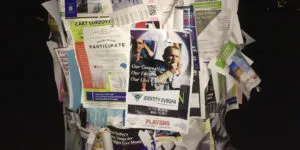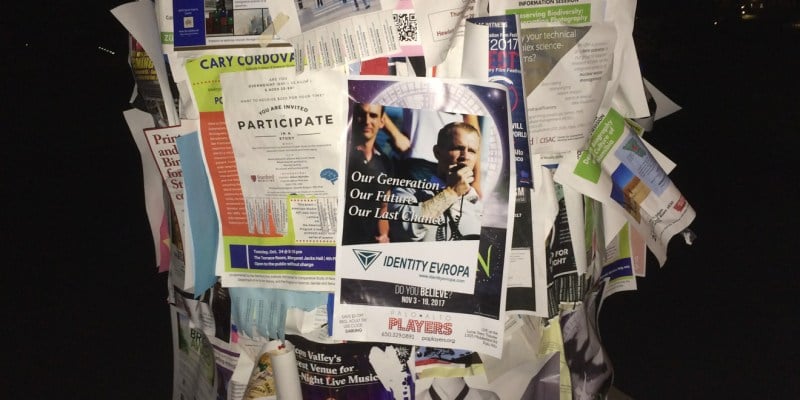During a cross-cultural Diwali celebration Monday night, Stanford Law School students discovered posters spreading a far less inclusive message — a white supremacist group had placed posters promoting “European visions of the post-catastrophic age” and “the end of idiocracy” at the law school, Meyer Green, Sweet Hall, Old Union and Tresidder Union.

Identity Evropa is a noted white supremacist organization that focuses on spreading its ethno-nationalist message among college students. The last few years have seen it push for “a utopian homeland for whites” on campuses throughout the nation.
In his interview with The Tab in February, Identity Evropa founder Nathan Damigo claimed that the group had “a guy at Stanford” in addition to “people at around 60 to 70 schools across the country.” However, a representative responding to The Daily declined to confirm whether it had active members at Stanford.
In the style of neo-Nazi activist Richard Spencer, the group seeks to present its discriminatory principles as respectable academic ideology. In an interview with The Tab, its founder explained that members “like to look sharp” and “paint a picture of a better world, a more aesthetic world.”
But according to others, their utopian vision is at best a facade.
“They make the organization look like it’s all about Socrates, Aristotle and Plato — but they have more in common with Hitler,” said Mark Potok, senior fellow at Alabama’s Southern Poverty Law Center, in an interview with CBS.
Potok noted that the group has no history of direct physical violence, although it did help to organize this summer’s white supremacist rally in Charlottesville, where counter-protester Heather Heyer was murdered.
Sometime Monday, an unknown affiliate of the group put up posters and stickers around the law school and other nearby parts of campus. The posters warned of the supposed threat to Europeans and European-Americans posed by other ethnicities.
Displayed alongside flyers for theatrical performances, part-time jobs and research opportunities, the white supremacist materials declared “Our Generation, Our Future, Our Last Chance” over images of grim-faced white men, among other slogans. Most of the posters were taken down between Monday night and Tuesday morning, though some posters as well as smaller stickers bearing the Identity Evropa logo remained on the boards around Meyer Green and Old Union as of press time.
Jasmine Miller, law student ’19 and co-president of the Asian and Pacific Islander Law Students Association (APILSA), was alerted to the initial batch of posters in the middle of a Diwali event co-hosted by APILSA.
“We were lining up for dinner when a person who had attended the event approached one of our speakers and said, ‘Hey, I think I saw a white nationalist poster downstairs,’” Miller recalled. “We were curious to know whether or not it was limited to the law school; like, if it was that just that we were targeted, or if it was the whole campus. So we walked over there towards the bookstore and … found two more.”
In response to the discovery, APILSA and a number of other “affinity groups” for law students wrote a letter to the Stanford Law School urging a decisive response to the hate speech.
“To be told in the middle of this community event that white nationalist messages were being put openly on display around the law school we consider home was devastating,” the letter said.
“This was the first time to our knowledge that Diwali was celebrated at the law school,” it added, “and the basic premise of [Monday’s] event was creating a space to reflect on the racism, hate crimes and other violence our communities — Hindus, Sikhs, Muslims and South Asians broadly — have faced, both after 9/11 and in the present-day climate.”
Stanford Law School Dean M. Elizabeth Magill and Vice Provost for Student Affairs Susie Brubaker-Cole issued a public statement denouncing the group and its discriminatory ideals.
“With these actions [Monday] night, it looks like Identity Evropa has put Stanford on its list of schools where it will try to advance its white supremacist cause,” they wrote. “They have come to the wrong place.”
These posters come in the wake of a number of discoveries of swastikas around campus over a span of several months as well as a cyber-attack in January that caused school printers to print anti-Semitic papers. In an email statement to The Daily, University spokesperson EJ Miranda wrote that the “hate speech and bigotry” these incidents represent as a whole are “antithetical” to Stanford’s values.
Commentators have claimed that President Donald Trump’s election last November energized alt-right and far-right organizations of this sort, particularly by capitalizing on the so-called “white identity politics” fundamental to Identity Evropa’s ethos.
“So many people are amped up,” explained San Bernardino State University Professor Brian Levin, scholar of extremist groups, in a Mercury News article on white nationalism in California. “They are now emboldened.”
Levin’s research reveals that “hate crimes in California were up 14.2 percent in California’s nine largest cities in 2016,” the Mercury article adds.
Statistics from the Southern Poverty Law Center, meanwhile, show that “the number of hate groups operating in the country in 2016 remained at near-historic highs,” with 25 new ones established since 2015.
In response to the incident on campus, student body president Justice Tention ’18 and vice president Vicki Niu ’18 took a stand on the values that Identity Evropa and its ilk represent.
“White Supremacy has no place in the Stanford community,” wrote Tention and Niu in an email to the Daily. “We denounce these posters and what they stand for. At Stanford we celebrate and build upon our diversity to support each other as a community.”
Contact Brian Contreras at brianc42 ‘at’ stanford.edu.
